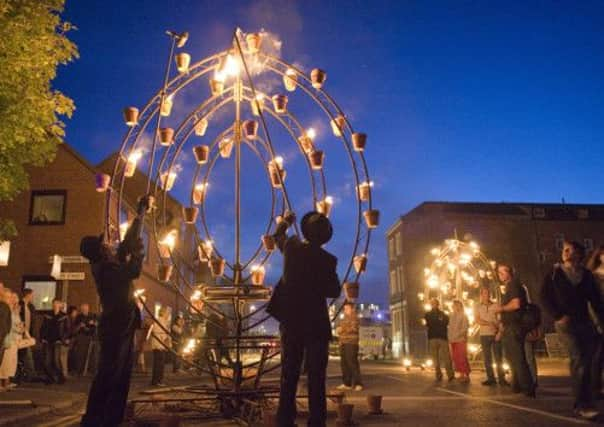John Meehan: A glimpse of future as Hull rises to challenge


It’s an enormous achievement and yet another major confidence boost for a much-maligned city which, despite the toughest of economic times is, unquestionably, on the rise.
A dark horse in the City of Culture race, Hull, yes Hull, left upmarket Chester, flourishing Aberdeen and the manufactured coalition of Portsmouth and Southampton trailing. Their dreams of a year in the sun are over – ours go on.
Advertisement
Hide AdAdvertisement
Hide AdAnd, at the risk of gloating, I can’t resist noting that Hull’s grounded, realistic bid, focused on long-term economic impact from stimulating cultural industries and developing the city as a major visitor destination has hit the right spot, where others missed the mark.
The celebrity-endorsed bids – Orlando Bloom for East Kent; Tom Daley for Plymouth and Billy Connolly for Aberdeen – have all bitten the dust. The City of Culture race is a serious business and the judges recognised that Hull’s self-styled “serious” bid has the potential to truly transform the city.
So can Hull claim the big prize? Of course it can! As well a highly-credible bid, which will now be fully fleshed out, Hull has two factors vital to the success of any human endeavour – belief and momentum.
Four years ago Hull experienced the disappointment of the also-rans now. It failed to make the shortlist.
Advertisement
Hide AdAdvertisement
Hide AdIn truth, that bid came before Hull was ready to be City of Culture and few in the city truly believed such an accolade was achievable or credible.
Now, so much is different, Hull’s cultural and artistic scene has developed significantly. Venues such as Fruit have opened and acted as a catalyst for creativity. The Freedom Festival is well established as an innovative and high-quality event. A host of other festivals have sprung up and thrived.
No doubt Leicester, Dundee and Swansea Bay will now do even more to marshal the local community behind their bids, but anybody who knows Hull, knows that no place can rival it for local passion and supporting our own – just ask Olympic boxing champion and Dancing On Ice star Luke Campbell. So let’s do some crystal ball gazing to imagine what being named as City of Culture 2017 will do for the city. Let’s look ahead to Hull in September 2017:
It’s a gloriously sunny Freedom Festival weekend (the sun always shines on Freedom).
Advertisement
Hide AdAdvertisement
Hide AdThe festival is a showpiece of Hull’s year as City of Culture and features scores of world-class cultural and artistic events spreading across the city centre and along Hull’s stunning waterfront. Hundreds of thousands of people experience Hull during the Freedom Festival and are amazed by how much it has to offer.
The festival offers an astonishing combination of artistic experiences, but it’s far from an one-off. Hull has no less than 24 other festivals and 1,500 events in an extraordinary 12 months of cultural and artistic expression.
At the heart of the Freedom Festival is the Fruit Market, now a thriving cultural quarter choc-a-bloc with independent, creative enterprises – performance spaces, galleries, craft collectives and so on.
Nearby the Marina has been rediscovered and benefits from a huge growth in visitors to the city, many drawn by the presence of HMS Illustrious moored nearby on the Humber. Not even the nearby roadworks, as Castle Street is upgraded and a land bridge constructed to link the city centre to the waterfront, can disturb the sense of a city that is on the move.
Advertisement
Hide AdAdvertisement
Hide AdVisitors love coming to Hull and are quick to return. The lucky locals can enjoy the city all year round, patronising the dozens of new, distinctive bars, restaurants and leisure venues which have sprung up in recent times. They thrive on the back of a buoyant economy transformed by unprecedented inward investment.
Along the waterfront, global giant Siemens’ wind turbine manufacturing and assembly plant is a striking symbol of Hull’s economic rebirth as the UK’s green energy capital. Hundreds of local people work there in well-paid, secure, skilled employment. The news that Hull was to be City of Culture 2017 was among the factors that persuaded the Siemens Board to finally commit to the city in late 2013.
Thousands more work in the supply chain clustered around the plant and in associated renewable energy industries on both banks of the Humber. The estuary is an economic powerhouse and Hull is its capital.
The sense of self-esteem and confidence is all-pervading. The people of Hull wear the City of Culture accolade as a badge of pride. They delight in welcoming tourists to a city whose attractions are increasingly being recognised nationally and internationally.
Advertisement
Hide AdAdvertisement
Hide AdOnce few people knew about Hull, while many others had unfairly negative perceptions of the place. Now Hull is recognised as a cultural hotbed; a city with a regenerated economy built on green energy industries; a place of sporting passion and success; and a great location for a weekend break or extended holiday. It is no less than a city reborn.
None of the above is a pipedream. It could all happen. After all, who would have thought, even two years ago, that Hull could now be so close to becoming the UK’s cultural capital. Just ask yourself, do you believe?